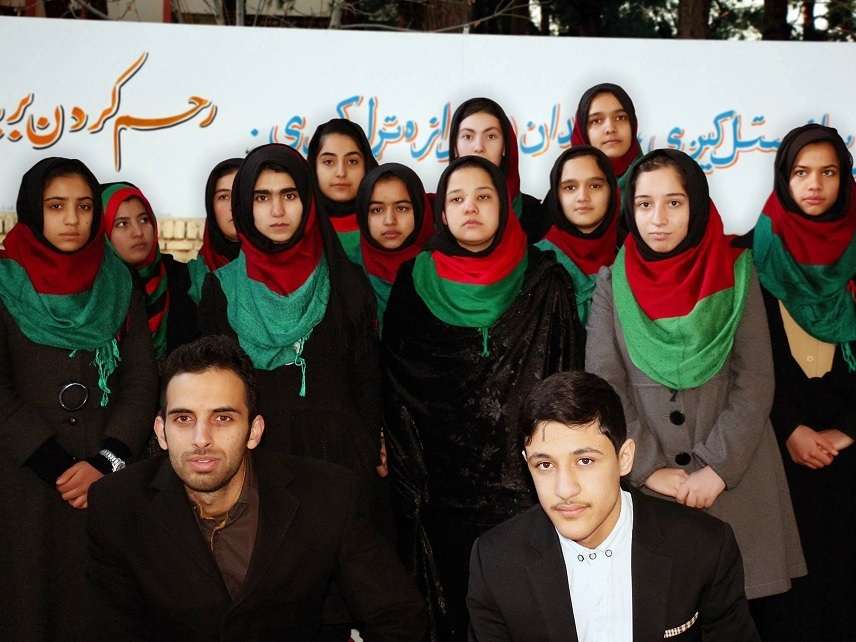Afghan Girl Roboticists Are Denied Visas and Everybody Is Angry
But the event's sponsor says its visa approval rate was remarkably high and that no other country could offer such access.

The State Department has rejected visa applications from Afghan and Gambian teams hoping to visit the United States for a robotics competition. But FIRST Global, the nonprofit that organized the event, expects all 160 other participant teams to be able to attend. Compared to the historical averages on such visa issuances, the group considers that a great success.
"I've been absolutely amazed at how well the coordination of the United States government State Department has been," says FIRST Global President Joe Sestak, formerly a Democratic congressman from Pennsylvania. More than a third of the participant countries have visa refusal rates of 40 to 80 percent, and many more have refusal rates of 35 percent. Given that, Sestak reports that his group "expected to have about a third of the countries potentially not be able to gain visas." Sestak notes that the State Department helped a number of applicant teams who were rejected on their first tries, and sent a memo to embassies all over the world letting them know about the competition.
In 2016, the visa refusal rate for Afghanistan was about 74 percent and for Gambia about 70 percent. Overall last year, the State Department rejected 2.7 million B1/B2 visas (the type of business travel visas used for the robotics competition).
Yet media coverage frequently left the impression that this year's visa rejections were unusual. A Washington Post editorial claimed the all-girls Afghan team's story had ended in tears "thanks to the U.S.," calling the visa denial "inexplicable" and "self-defeating." Many news reports mention that few B1/B2 visas have approved from Afghanistan this year, but few if any note last year's refusal rate. The English-language Daily Times in Pakistan even suggested that the Afghan team was rejected because it couldn't be fit into the "white savior" narrative.
Sestak has written several letters, including one he posted on Facebook, to try to clarify the matter.
"The first interview that I gave, they didn't take what I had said, but you know, I understand that," Sestak says. "Journalists need to do what they feel is right and I accept that."
Sestak also rejects the idea that such competitions should be held outside the country in the age of Trump. "No other nation would have such access as ours," he says. "The proof of that is Iran's coming. Sudan's coming." Both countries are affected by President Trump's travel ban.
The Iranian team did face a different hurdle related to U.S. foreign policy. A number of teams come from countries that face U.S. sanctions. While FIRST Global was able to ship materials to Cuba and Sudan, they were unable to do the same for the Iranians. Instead, Iran's team worked with American high school students to build a robot remotely. The Iranians will attend the competition next week.
The teams from Afghanistan and Gambia were allowed to ship their robots to the U.S. So if they're unable to secure visas at the last moment, they will still participate in the competition via Skype.
Despite the high rate of visa approval for this competition, visa issuances have gone down during the Trump administration. In 2016 the State Department approved about 2,000 B1/B2 visas for Afghanistan, but it is on track to approve closer to 1,000 this year. Last year it approved about 23,000 B1/B2 visas for Iran and 13,000 for Iraq; this year the numbers are on track to be 13,000 from Iran and 7,700 from Iraq. Other travel ban countries have fared worse. More than 1,400 B1/B2 visas were approved for Libyans last year; this year Libya is on track for just 150 approvals.
But Trump's border-control rhetoric is often far harsher than what U.S. laws actually permit. When media outlets paint the grimmest possible portrait of travel to the United States, they end up helping Trump, because they treat his words as the overwhelmingly defining factor in an area that in fact is far more complex and is not exclusively under the president's control.


Show Comments (35)